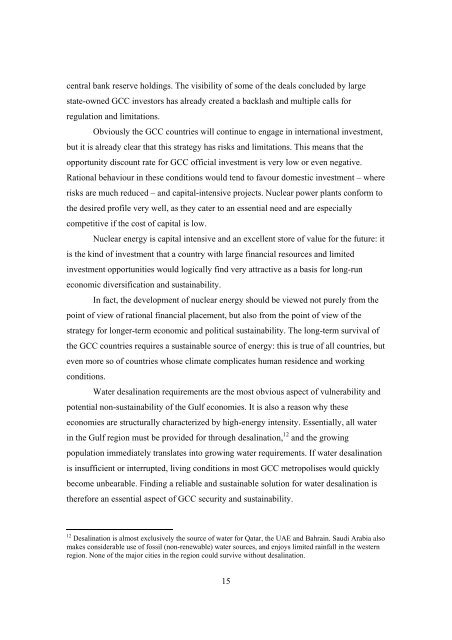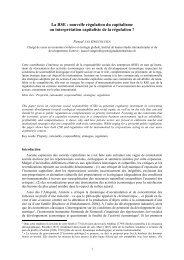PDF - Graduate Institute of International and Development Studies
PDF - Graduate Institute of International and Development Studies
PDF - Graduate Institute of International and Development Studies
Create successful ePaper yourself
Turn your PDF publications into a flip-book with our unique Google optimized e-Paper software.
central bank reserve holdings. The visibility <strong>of</strong> some <strong>of</strong> the deals concluded by large<br />
state-owned GCC investors has already created a backlash <strong>and</strong> multiple calls for<br />
regulation <strong>and</strong> limitations.<br />
Obviously the GCC countries will continue to engage in international investment,<br />
but it is already clear that this strategy has risks <strong>and</strong> limitations. This means that the<br />
opportunity discount rate for GCC <strong>of</strong>ficial investment is very low or even negative.<br />
Rational behaviour in these conditions would tend to favour domestic investment – where<br />
risks are much reduced – <strong>and</strong> capital-intensive projects. Nuclear power plants conform to<br />
the desired pr<strong>of</strong>ile very well, as they cater to an essential need <strong>and</strong> are especially<br />
competitive if the cost <strong>of</strong> capital is low.<br />
Nuclear energy is capital intensive <strong>and</strong> an excellent store <strong>of</strong> value for the future: it<br />
is the kind <strong>of</strong> investment that a country with large financial resources <strong>and</strong> limited<br />
investment opportunities would logically find very attractive as a basis for long-run<br />
economic diversification <strong>and</strong> sustainability.<br />
In fact, the development <strong>of</strong> nuclear energy should be viewed not purely from the<br />
point <strong>of</strong> view <strong>of</strong> rational financial placement, but also from the point <strong>of</strong> view <strong>of</strong> the<br />
strategy for longer-term economic <strong>and</strong> political sustainability. The long-term survival <strong>of</strong><br />
the GCC countries requires a sustainable source <strong>of</strong> energy: this is true <strong>of</strong> all countries, but<br />
even more so <strong>of</strong> countries whose climate complicates human residence <strong>and</strong> working<br />
conditions.<br />
Water desalination requirements are the most obvious aspect <strong>of</strong> vulnerability <strong>and</strong><br />
potential non-sustainability <strong>of</strong> the Gulf economies. It is also a reason why these<br />
economies are structurally characterized by high-energy intensity. Essentially, all water<br />
in the Gulf region must be provided for through desalination, 12 <strong>and</strong> the growing<br />
population immediately translates into growing water requirements. If water desalination<br />
is insufficient or interrupted, living conditions in most GCC metropolises would quickly<br />
become unbearable. Finding a reliable <strong>and</strong> sustainable solution for water desalination is<br />
therefore an essential aspect <strong>of</strong> GCC security <strong>and</strong> sustainability.<br />
12 Desalination is almost exclusively the source <strong>of</strong> water for Qatar, the UAE <strong>and</strong> Bahrain. Saudi Arabia also<br />
makes considerable use <strong>of</strong> fossil (non-renewable) water sources, <strong>and</strong> enjoys limited rainfall in the western<br />
region. None <strong>of</strong> the major cities in the region could survive without desalination.<br />
15




